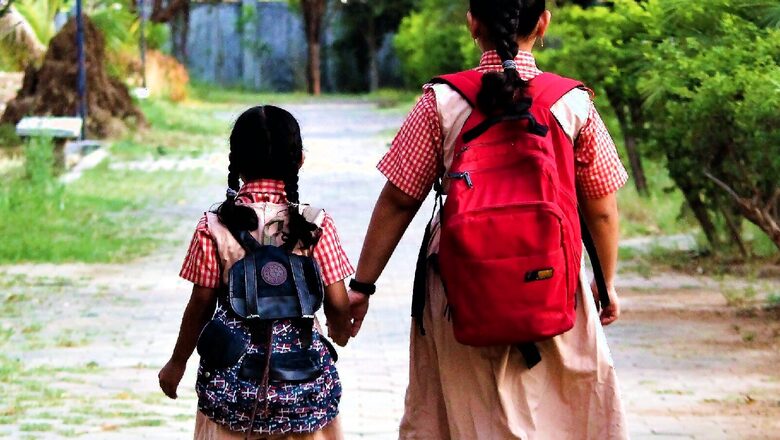
views
Schooling has been a matter of enthusiastic, and often passionate, debate since the COVID-19 pandemic struck the world. On March 24, 2020, the Indian government declared a nationwide lockdown; schools were shut although other essential services continued to function. What began as a temporary three-week measure to keep the virus at bay saw multiple extensions.
The curious case of school closures however outran everything else and lasted for almost two years. Students, parents and teachers alike have struggled for the last two years with online schooling, hybrid schooling, managing children stuck at home amid work-from-home, health and financial crises, not to mention the concerns over back-to-school guidelines over the past few months.
An undeniable negative consequence on the mental health of children due to the extended lockdown is now evident. Levels of anxiety, depression, sleep disturbances, stress, especially about academic performance, have soared to never-before seen levels among children. It is evident that the children going back to schools now are no longer the ones who walked out in March 2020. They are the survivors of a catastrophe.
Largely raised in relative prosperity, this is a generation that has faced sudden and prolonged adversity and has been traumatised. Hardly have the waters settled and mandatory masking revoked, we are faced with the spectre of increasing cases being reported from certain parts of the country. Parents find themselves facing another Catch-22 situation – to school or not to school?
Let us try and see this valid dilemma in perspective.
ALSO READ | Our Kids are Living Like Middle-aged Executives – And That Can’t Be Good for Their Health
What We Know about COVID Infections in Children
First and foremost, let us examine what we know now (after a 24-month relationship) about COVID infections in children. One, children could catch the virus as easily as adults but the infection is far more mild and outcomes are uneventful. Two, the few who develop a moderate to severe disease are generally those who have some comorbidity. Even they have recovered well with appropriate treatment. Good recovery includes the rare ones who develop the Multisystem Inflammatory Syndrome. The proportion of children who have died due to COVID is 0.2 per cent of the total mortality. In simpler words, if 1000 people have died due to COVID, 998 of them would be adults. Overall, the risk of morbidity and mortality due to COVID infections in children is not significantly higher than that due to tuberculosis or malaria or dengue or influenza.
Three, most children have developed antibodies post a clinical or sub-clinical infection with COVID. In fact, a study conducted in Mumbai in the first year of the lockdown when hardly anyone was venturing outdoors and certainly all children were indoors showed that half the child population had already been infected. This clearly demonstrated that adults were passing the infection to the children, not vice versa but children were bearing the psychoeducational trauma of school shutdown.
After the unlock, when almost everyone is outdoors, a much higher proportion of children have developed immunity to the virus. Recent sero surveillance studies across India have confirmed that most children would have developed antibodies to the virus. Thus, attending schools now is unlikely to infect children in the proportion assumed earlier. Four, studies across the world, where schools were open during the pandemic, have not shown any outbreak related to schools. Further, adolescents in large numbers have been vaccinated in India.
Do Children Carry Infection Home?
The second cause of worry is the assumption that with schools being open, children would infect each other and spread it to their teachers or carry it home and infect the adults, especially the grandparents who we do know have a higher risk of severe disease given their comorbidities at that age. Well, the risk to the latter is much greater from the other adults in the household or visitors who have now resumed their daily chores. It is unlikely that the risk would emanate significantly or only from ‘children who carry the infection home’. Besides, the adult population has been largely vaccinated. Most adults in India have received at least one dose of the vaccine. Thus, the overall risk of transmission to adults is low; that from children attending schools is largely theoretical.
Hence, only those families who have been in total isolation and continue to do so, and have not been vaccinated as well as have comorbidities would face a risk from sending their children to school. These rare families do have the option of not sending their children to school. This, however, does not afford any logic for schools being shut for all.
Our Kids Need Regular Schools
This is not to say that we may throw caution to the wind. Simple but effective measures of protection like masks, avoiding undue crowding and maintaining hygiene cannot be dispensed with. Children may be encouraged to wear masks till such time that the local authorities make it mandatory in case there is a spike in local cases, not otherwise.
Ever more significant, we know for certain the benefits of vaccination in adults. Mandating vaccines for adults (notwithstanding the opposition from a few sections) would have a higher degree of protection for all rather than shutting down schools. Not doing the former does not permit scapegoating of schools. Hence, those who of their own free will may have chosen to remain unvaccinated may exercise caution and avoid sending their children to school. Those who have chosen to get vaccinated need not let their children suffer.
The way ahead is clear. Adults should try and get themselves fully vaccinated at the earliest. Second, children should be encouraged to practice COVID-appropriate behaviour. If the parents know that the child has a comorbidity due to which they are at a higher risk [of severe COVID-19 illness], those children should not be sent to school.
Parents also have a duty to be careful and responsible to make it safe for everyone in school. If their child has any symptoms like cough or cold or fever, they have to make sure that the child doesn’t go to school. The child can resume school once their symptoms abate or after the mandatory quarantine period if they test positive for COVID.
Our kids need regular schools. Period. The lack of social play with peers, interaction with teachers and other members and a daily routine, and hyper-dependence on mobiles have gone on for far too long. Instead of planning a shutdown of schools yet again, as parents a decision should be made as to how children can be sent to school with safety measures intact. The benefits of physical school far outweigh the risks. The Indian Academy of Pediatrics has released detailed guidelines on how to successfully restart school. It is high time we join hands to help overcome the hurdles rather than treat them as setbacks and give up.
ALSO READ | Screening Now: X Rated Variants. Why We Should Avoid Any Infection, Not Just Severe Illness
Dr Samir Hasan Dalwai is a consultant developmental behavioural pediatrician, member of the Indian Academy of Pediatrics and member of Government of Maharashtra Task Force for Pediatric COVID.
Dr Misbah Khan is a Pediatrician with interest in neonatology and developmental pediatrics at New Horizons Child Development Centre and Cloud 9 Hospital. The views expressed in this article are those of the authors and do not represent the stand of this publication.
Read all the Latest Opinions here



















Comments
0 comment